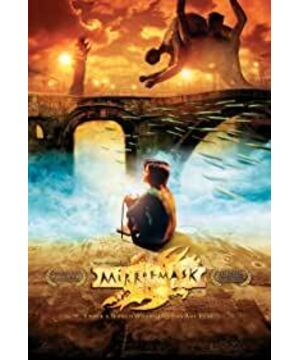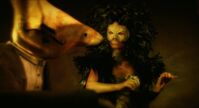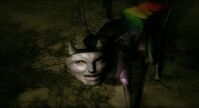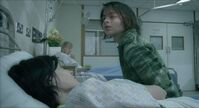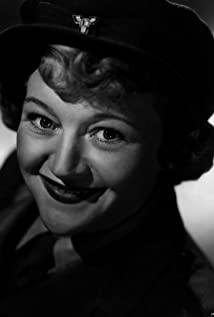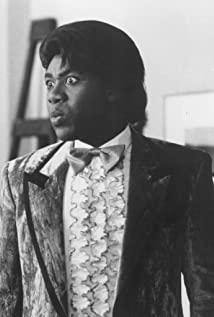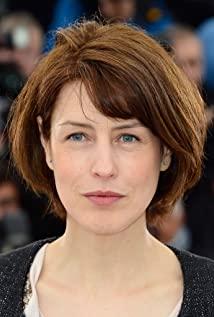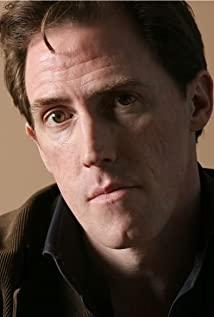As the saying goes, a thousand readers have a thousand Hamlets. After watching this movie, I didn't get any positive motivation, and I didn't think Helena realized the reality through this dream. Instead, I felt that my mother was like this movie. The big boss of the dream, and successfully controlled the heroine, and won the struggle for the child's independent control rights. This contest was won.
I know this concept may not be very good. Although I have read a lot of film reviews and told the story of Helena trying to escape from the real world and then come back, there are many details in the film that people cannot ignore, nor can Helena be reassured. Grow up, say goodbye to rebellion, such a conclusion.
This thing is actually like: When you were young, there were many things you didn’t understand adults, you hated their behaviors, and you swore childishly that I would never do this when you grew up; but when you really grew up, you changed You have become a standard adult. At this time, regarding the vows you made when you were young, you would say "I was still young and ignorant at that time".
From the perspective of an adult, the perspective of children must be wrong, because they lack experience and have not experienced the world, but when you have those experiences, you will never be able to think like a child, but instead. There are many times when children do unimaginable things, and it is up to them to explain themselves, and you suddenly realize that it is you who think so.
If growing up is truly omnipotent, why can't adults fully understand children? The fact is that growing up does not make a person omniscient and omnipotent, but let go of some things while gaining some.
Let me tell you a few things that I find very strange in the whole film:
I watched this movie twice in a row. The most intuitive and weird thing about the first time was that when the White Queen woke up, the smile on the corner of her mouth really didn't look like a warm smile like a recovery from a long illness. That kind of smile of the villain's (mistakenly) successful...!
However, there is actually a part of the reason for the lens switching here. The subsequent pictures are switched through the distorted lens, so it is not ruled out that it is a distortion effect... But anyway, I am a bit creepy here.
Then again, my most intuitive feeling about this film after watching it for the first time is that this is a story about fighting against parents (mainly mothers in the film).
Think about the logic of the movie:
The heroine doesn't like life in the circus. She paints when she is alone, and uses socks as a villain to simulate dialogue, and builds a black and white world, but her mother requires the heroine to continue juggling for her livelihood and her father's dream. The heroine shouted in a crying voice that she didn't want to juggle, but wanted real life. Mom said: You are so selfish, how do you know what real life is, I'm about to be mad at you. The hostess talks back, I really hope you are pissed off.
When it got here, the heroine also muttered to herself in the tone of the imitator's mother: You can't deal with real life at all, silly child. Completely sarcastic and helpless tone, should not agree.
Then my mother really got sick and was hospitalized, so the heroine felt that it was all her fault.
Then her father comforted her not to think like this, but the heroine should still blame herself, and then entered a fantasy world. I don't know if it is a heroine's dream, because there are some bugs, let's call it a dream first, a dream The setting is because the black princess' runaway caused the world to become unbalanced, the shadows invaded the city, and the white queen fell into a coma.
In the dream, the heroine naturally wanted to save the White Queen. After various operations, she finally sucked the black princess who escaped from the dream back into the dream world. At this time, she shouted: You can't cope with real life at all.
This is interpreted by many people as the heroine who has grown up, and she realizes that the willfulness of the black princess has caused the end of the world (dream), and the white queen is in a coma. Then she corrects everything, the world recovers, and in reality, the mother wakes up, and then the circus turns the corner and becomes the best circus, which seems like a happy ending.
But if it is really interpreted in this way, does it mean that we subconsciously accept that the heroine's mother's illness is caused by the heroine's anger, she obediently obeys, and repeats what her mother said, "You can't cope with the real world at all" Mommy Just woke up and came back.
If you don't have such a dream, I'm afraid many people can't accept this story in pure reality. The heroine is indeed rebellious. When she was fighting for this sovereignty about what she was doing, she quarreled with her mother, and then her mother fell ill, for the sake of mother's health. , the heroine gave in and finally stayed in the circus... Is this kind of story reasonable? It's more like a more selfish victory for the mother to use the heroine's self-blame to win, maybe it happens to many people in reality would say it was a moral kidnapping.
The most terrifying thing is that I saw a film review saying that I would show it to my adolescent children in the future. Maybe from the mother's point of view, the return of the heroine is indeed a good thing.
Talking about the black and white queen in the dream, the black queen should be seen by everyone: she devours the city, causes turmoil, and forcibly changes her daughter's clothes. When the heroine argued with the black queen, the heroine said, the black princess is not your pet, can't she make her own choice? The Black Queen refused outright.
It can be seen that she represents the strong controlling and possessive side of motherhood, and is a worried and negative mother image.
As for the White Queen in the dream, the fantasy awakened in the middle reminded the heroine not to give up looking for the lost things, and through the servants of the White Queen, it was expressed that the Black Princess stole the spell from the White Queen, causing the world to become unbalanced, and the White Queen was in a coma. is the image of a tender victim.
It can be seen from the setting of this dream that no matter how powerful the white queen is, as long as the black princess wants to leave this world, the two worlds ruled by the black and white queen will be in chaos. She sets that the black princess is not there, then The world is collapsing, and the white queen can only wake up when the black princess is retrieved. Isn't this a flawed system? Isn't the setting of the world itself the system set up by the heroine because of self-blame? Through her efforts, saving the world is equivalent to the seemingly "correct" result demonstrated under false premises and assumptions.
A few more metaphors
The first is Van Luntai. This is the name that the heroine made up when she first told the story with socks, but she dreamed of it in a dream, and then met the same person in reality. The heroine said he was a waiter, and he was surprised Undecided for a moment. I won't discuss whether it is forcibly the same person here, but let's talk about the weirdness:
First of all, the mother quarreled with the heroine at the beginning, and said that there are children outside who want to come in (enter the circus) - Van Luntai is the one who wants to come in.
Besides, in the dream, the heroine found the mirror mask and Fan Luntai was on the way to escape. Fan ran and ran when he saw a big fruit and stopped running. He stopped to eat the fruit, and then an old lady came out out of nowhere, saying that she was a holy person and ate it. When I see the future, I will write a book.
In this passage, apart from Van Luntai dreaming that he escaped from the dream and became a waiter in the real world, to pave the way for future encounters, why should he emphasize writing books? What book to write?
The little red book in the hand of the heroine is always listening to her mother's words repeatedly. Is it possible that it was written by Van Luntai after seeing the future?
In his dreams, he kept mentioning that he was an important character. First, he betrayed the heroine for the gem of the Black Queen, and then he returned to the heroine;
When facing the intrusion of the black queen, he took out his tower again, why is it a tower, why does he have a tower?
Why did he keep repeating his quarrel with the tower, but he refused to apologize, and finally had to apologize, and the tower came out to save him? What does this setting mean?
The timeline is pulled back to the beginning of the film. This tower is a greeting card from the heroine to her mother wishing her to be discharged from the hospital soon, and it is placed in front of her mother's hospital bed.
And the heroine had a little episode when she visited her mother. The fruit she gave to her mother yesterday disappeared, and she suspected that the grandma in the next bed had eaten it. Then in the dream, she told the heroine that the fruit was the grandma of a holy person. Is this the real grandmother? In reality, the mother denied it and said that the fruit is not eaten by the grandmother, so who eats it?
Is it implying that Van Luntai is actually the one who eats the fruit, and the old lady is telling the heroine that the fruit eater wrote this book, and the book repeatedly reminds the heroine to listen to her mother's words. Could it be that Van Loontay was actually an undercover agent for his mother?
And Van Luntai, who appeared in reality at the end of the film, first said hello to his mother and said he wanted to join the circus, but would he have appeared in his life long ago? When his mother quarreled, would someone want to join the circus? Is it him? And then let the heroine have feelings for him and leave the heroine?
Why did the white queen say in the dream, this is my dream, the heroine thinks it is her own dream, but the reality is that the dream of the heroine includes the places where her paintings go, which is from when she finally woke up on the top of the building It can be seen that she has indeed achieved a time-travel (excluding the possibility of her sleepwalking), so if you say this, does the picture next to the mother's hospital bed have the ability to make mother fall into a dream?
On the other hand, from the time line, the heroine sleeps at night, and the mother wants to have an operation the next day. The strange thing is that neither father nor daughter went to the hospital during the operation, but received a call on the top floor and learned that mother was awake. If the dream is simply attributed to the "dream" of the heroine, then her ability to move can only be the result of sleepwalking, (because the place where she first met Van Luntai is not the top floor from the point of view of the film) and if it is really In a dream, why did no one wake up my mother's operation the next day, but woke up to receive a call that her mother's operation had been successful?
All the unreasonable parts of reality make me more willing to believe that this is not our usual dream, but a different world that really exists, but it is not the ideal real world that the heroine can freely control, because it is ridiculous , No matter in reality or fantasy, the mother's existence is to control and possess her daughter. The heroine wants to escape from this control in reality, and the mother is sick and hospitalized; the black princess wants to escape in the fantasy world, and the white queen is unconscious and the world is about to collapse.
The final result was that the black princess returned to another world, and the heroine said something in her mouth: You can't cope with the real world at all, and the righteous and stern words on that face are more and more like mother.
Put some more weird and inexplicable pictures
What is the director expressing through the heroine's mouth?
Fan Luntai talked about his mother's quotes... What world is a dog bites a dog Barabala, the main struggle in this plot is that the heroine fights back to her own world to call back the black princess, Fan is encouraging the heroine not to give up looking for a mirror, but think about her Really found her own world, even if she defeated the black princess?
Fan added after that, but she wasn't actually my mother, she and another man bought me.
I think there are many details in this movie, including that the prototype of the dove beast that appeared in the dream is the one from the circus in reality:
It can be seen that the director still set many things in the dream as reference prototypes. It is indeed rich in imagination, but it is not completely imaginative. The design of many lines is also the same, so I don’t believe that Fan Luntai’s lines are meaningless. He What does it mean that he was bought by his mother?
In short, many details are faintly revealing weirdness, and the more I look at it, the more I feel that this is more like a conspiracy.
I am not writing this review to say that mothers are control freaks, and everything they do to their daughters is a conspiracy, but I just find it interesting that this movie is obviously full of depression throughout the whole movie, but in the end it comes to such a conclusion of regression , and most film critics agree that the heroine should grow up, and my mother is right. The more this is, the more inexplicable coercion feels. We are not sure whether the film itself has this intention or not, or maybe it The original intention is to be positive, but in terms of logic and various metaphors, it highlights conspiracy. This is probably a kind of AB face that appears when discussing moral and ethical issues.
View more about Mirrormask reviews


